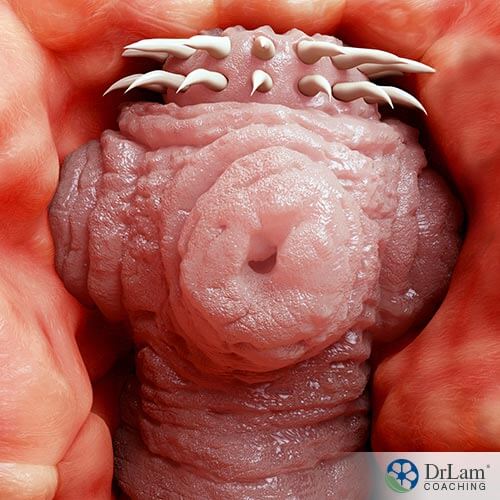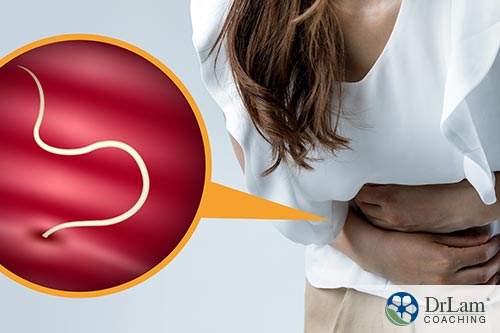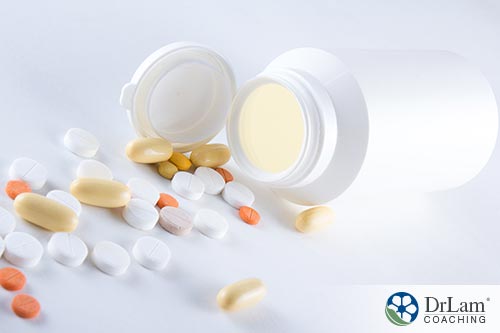 Not many people in the west imagine that they could get intestinal parasites. But the fact is, with travel and even at home, it can happen. And it can cause a lot of health problems. Unfortunately, it can be quite difficult to notice when it occurs, as some worms can live in your gut for years without causing symptoms.
Not many people in the west imagine that they could get intestinal parasites. But the fact is, with travel and even at home, it can happen. And it can cause a lot of health problems. Unfortunately, it can be quite difficult to notice when it occurs, as some worms can live in your gut for years without causing symptoms.
Symptoms of parasitic infections include:
If you have a combination of some of these symptoms and suspect you may have parasitic infections, you can get tested. There are several treatment options available with varying degrees of efficacy. But you’ll definitely want to do what you can to get rid of them as long-term infection can cause serious health issues.
People most at risk of complications are the elderly, those with HIV or AIDS, those with other serious conditions, and those with compromised immune systems. Lowered immunity is also found in people with Adrenal Fatigue Syndrome (AFS). AFS is a condition that arises from chronic stress. Your adrenal glands have to work extra hard to produce cortisol, your most potent stress-fighting hormone. But after a while, the adrenals will dysregulate, and you can start to see more severe symptoms.
Symptoms of AFS include fatigue, insomnia, weight gain, brain fog, anxiety, mild depression, hair loss, dry skin, loss of libido, PMS, infertility, hypoglycemia, salt and sugar cravings, food and drug sensitivities, heart palpitations, lowered immunity, frequent colds and flu, and an inability to handle stress.
Your adrenals are part of the Hormone circuit of your NeuroEndoMetabolic (NEM) Stress Response. Your NEM is your body’s global response to stress, and it’s composed of the Hormone, Bioenergetics, Cardionomic, Neuroaffect, Inflammation, and Detoxification circuits.
The Hormone circuit is almost always the first to engage when there’s stress. And that’s because of how important stress hormones, such as cortisol, are to the stress response. But every other circuit plays a role. And when it comes to intestinal parasites, the other very important circuit is the Inflammation circuit.
The Inflammation circuit is composed of the immune system, the gut, and the microbiome. All three components work in tandem, and if one of them is affected, the entire circuit is affected. Intestinal parasites affect all three components.
When a parasite invades your gastrointestinal (GI) tract, your immune system will recognize it as a threat and launch an attack. It creates inflammation as a way to get rid of the parasite. More specifically with parasitic worms, the type of inflammation is type 2, which involves certain types of immune cells. This inflammatory response also involves the epithelial cells that line your gut, which take part in trying to eliminate the worms. The interesting thing is that your gut actually contains around a third of your immune system cells, and which is why inflammation so frequently begins in the gut.
Your gut’s microbiome, composed of the different types of flora that live in your gut, is also key to your inflammatory and immune responses. So a healthy gut and microbiome could already play a key role in the prevention of such invasions as well as in their expulsion.
 Unfortunately, not all immune attacks and inflammatory responses manage to get rid of intestinal parasites. This is especially true if your immune system is weak or you have gut and microbiome issues.
Unfortunately, not all immune attacks and inflammatory responses manage to get rid of intestinal parasites. This is especially true if your immune system is weak or you have gut and microbiome issues.
What happens then is that your immune system gets triggered frequently, since the worms are still there, but doesn’t effectively destroy them. The inflammation then turns from acute to chronic, and it runs the risk of then spreading to other parts of your body. Inflammation that travels to the brain can cause neurological and psychological symptoms. If it travels to the skin, it can cause rashes and inflammation there. Inflammation that travels to the joints can cause pain and stiffness there.
This is what happens when your Inflammation Circuit dysregulates. The inflammation gets out of hand and spreads all over the body. It then becomes a trigger for many other chronic conditions, including adrenal fatigue. Nothing is as stressful on the body as constant inflammation, and this contributes to overworked adrenals.
To make matters worse, when your adrenals dysregulate, their cortisol output dysregulates as well. And the level of cortisol in the body has a big effect on inflammation. Too much of it will trigger inflammation. Too little of it will allow the inflammation to run amok.
So it is imperative that you get tested and treated for any parasites if you suspect you may have them. The sooner you do that, the bigger chance you have of preventing chronic inflammation or other serious complications from developing or spreading.
There are a few ways to check for parasitic worms in the body:
However, it's important to note that you may also have concomitant conditions, or the parasites caused enough damage that you now have another condition that needs its own diagnosis and treatment plan. Of course, getting rid of the parasites will help that anyway, but it may not be enough.
For example, if you developed AFS due to the parasites, removing them may not be enough to recover completely. You may need to address the adrenal fatigue itself through dietary and lifestyle changes. These include adopting the adrenal fatigue diet, following a personalized supplement protocol, doing adrenal yoga and adrenal breathing exercises, getting enough rest and sleep, and managing your stress levels.
The most effective way of addressing parasites will depend on your condition, including what kind of parasites you have, how long you’ve had them, your age, and your current health. Your health professional will need to take all of these into account and then devise the best protocol for you. It may only require one type of therapy or a combination of different ones.
The following are some of the care options available:
 This is the main type of therapy, and it’s by prescription only. It’s a type of medication that kills parasites and allows them to be excreted by your body. There are different types of antiparasitic drugs, depending on the type of worm you have, such as tapeworms, hookworms, flukes, trichinosis worms, and, more commonly in children, pinworms.
This is the main type of therapy, and it’s by prescription only. It’s a type of medication that kills parasites and allows them to be excreted by your body. There are different types of antiparasitic drugs, depending on the type of worm you have, such as tapeworms, hookworms, flukes, trichinosis worms, and, more commonly in children, pinworms.
And, depending on the severity of the infection, you may need only one dose or many. It’s important that, if this is the option that your doctor recommends, you make sure you do your best to support your gut and microbiome. These medications can sometimes be a little hard on the GI tract and adrenals, and you don’t want your NEM to dysregulate further while taking them.
The best way to do that is to have a NEM-specialist create a protocol for you to follow before, during, and after antiparasitic treatment. That protocol will most likely involve a specific diet and supplement regimen, including prebiotics and probiotics for example. The diet and supplements should help support your GI tract as much as possible and help to rebuild your microbiome.
Please note that, although herbal remedies come from natural herbs, they are still considered medicinal. They can and do have contraindications with other medications, they can create side-effects, and some can aggravate AFS. Also, just because they are natural herbs doesn’t mean you should be self-administering them. Your treatment should be prescribed and supervised by a health professional.
But some possible herbs that may help with intestinal parasites include:
With homeopathy, it’s difficult to specify which remedies are good for intestinal parasites as the method of prescribing these remedies is very much person-specific. A homeopath will likely take time to record the details of not just your physical condition, but your overall wellbeing. This includes your emotional and environmental circumstances. But some possible homeopathic remedies that can help include Sina, Indigo, and Sabadilla. In addition, Low Dose Immunotherapy, which is homeopathic water that has been diluted with the bioenergetic frequencies of parasites, could also be used to help your body build a tolerance to the parasites in your body.
Some of the above herbs can be taken in supplement form. But there are also other types of supplements that can help, such as:
Your diet should also be conducive to recovery. In general, the adrenal fatigue diet is good for almost all other kinds of conditions. But you may want to pay special attention to your fiber and water intake. Fiber can help get rid of worms, and water flushes them out. Also, adding garlic, carrots, pumpkin seeds, honey, papaya seeds, and beets can help. You will also want to avoid foods that support worm growth, such as simple carbs and dairy products.
 Intestinal parasites can cause challenging health problems. It’s better to try your best to prevent getting infected than to have to go through illness and treatment. This includes cooking your meat well, separating your cutting boards so that you don’t contaminate any raw fruits and vegetables from the meat, drinking bottled or properly filtered water in areas where the water is contaminated, and keeping your immune system strong.
Intestinal parasites can cause challenging health problems. It’s better to try your best to prevent getting infected than to have to go through illness and treatment. This includes cooking your meat well, separating your cutting boards so that you don’t contaminate any raw fruits and vegetables from the meat, drinking bottled or properly filtered water in areas where the water is contaminated, and keeping your immune system strong.
If you do get infected, the earlier you get treated the better. So if you suspect any of the symptoms we mentioned, it’s best to get tested. Then, along with the help of your doctor, you will follow a protocol that may include antiparasitic drugs, herbs, supplements, homeopathic remedies, and dietary changes.
Your doctor should also take into account the state of your adrenals and NEM. Your main aim should be to get rid of the parasites while restoring balance to your Hormone and Inflammation circuits. Many doctors don’t know about or don’t recognize AFS. If that’s your case, you may want to consult with a health professional experienced with it as well as with parasitic infections.
If you have questions about intestinal parasites, how they might affect your AFS and Inflammation circuit, inflammation, or adrenal fatigue in general, you can contact the Dr. Lam Coaching team. We can offer you a free** no-obligation phone consultation at +1 (626) 571-1234 where we will privately discuss your symptoms and what your options are. You can also send us a question through our Ask The Doctor system by clicking here.
Although intestinal parasites sound scary, in most cases, they can be treated quickly and permanently. What you do have to pay attention to is how to restore the health of your gut, microbiome, and Inflammation circuit after these treatments. Here’s all you need to know.
